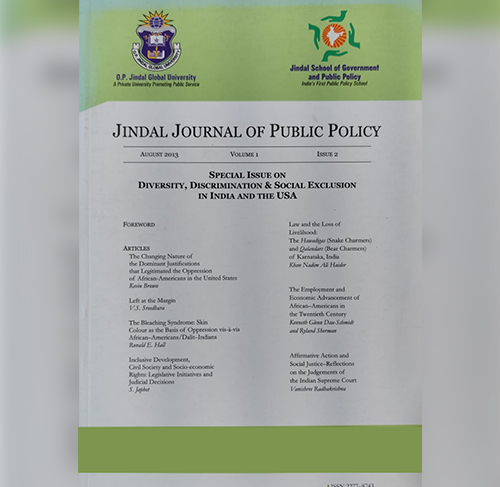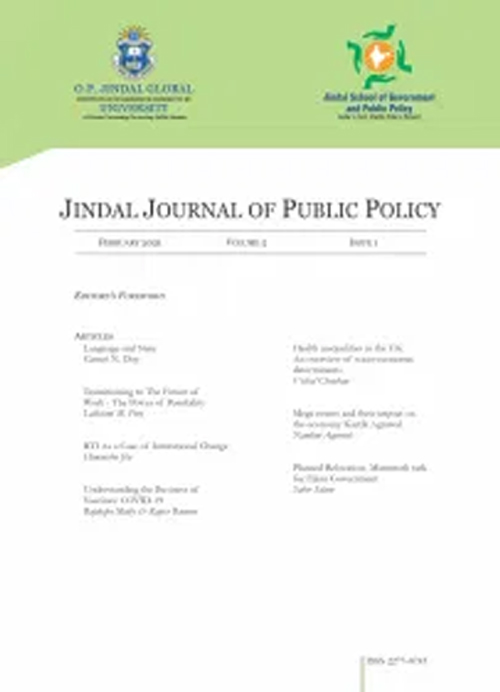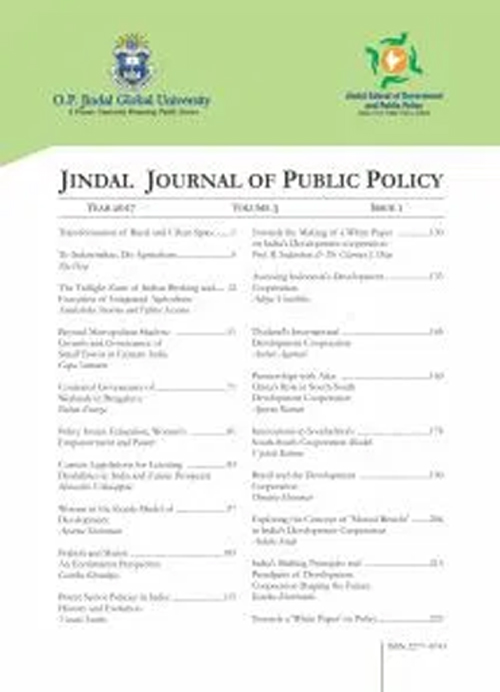
The Jindal Journal of Public Policy (JJPP) is the flagship academic publication of the Jindal School of Government and Public Policy (JSGP). JJPP is one of the crucial arms of JSGP aspiring to publish and disseminate rigorous theoretical, applied and empirical research that augments our existing understanding of public policies and their impact. It welcomes original and unpublished essays from all social science disciplines and all shades of intellectual persuasions. All essays published in the Journal are subjected to rigorous peer review, based on initial editors’ screening and double-blind referring by independent experts.
The main areas covered by the Journal are as follows:
Manuscripts should be sent in electronic format (word document) and addressed to the Executive Editors at jjpp@jgu.edu.in.
For submission details, click here
Submission could be of three kinds:

The Jindal Journal of Public Policy (JJPP) is the flagship academic publication of the Jindal School of Government and Public Policy (JSGP). JJPP is one of the crucial arms of JSGP aspiring to publish and disseminate rigorous theoretical, applied and empirical research that augments our existing understanding of public policies and their impact. It welcomes original and unpublished essays from all social science disciplines and all shades of intellectual persuasions. All essays published in the Journal are subjected to rigorous peer review, based on initial editors' screening and double-blind referring by independent experts.
Editor's Forward
Dear Readers,
Most regional and global issues are rooted in local realities, and so are their solutions and responses. At present, more than 100 million people are displaced and forced to flee their homes, accounting for 1 in every 78 people globally. As wars, conflicts, health emergencies, and climate and economic crises accelerate, migrants (including displaced people) face enormous challenges related to safety, access to basic needs, and integration. Furthermore, the pandemic and the failure of effective local and international responses to protect migrant rights have exposed the injustice faced by the displaced communities during this health crisis. We want to call attention to the fact that when migrants are in a crisis, all levels of society are affected. As such, understanding the problems and solutions in international and local groups through discussions, deliberations, and evidence are crucial and essential. There is a need for rigorous research to fill in the evidence gaps between policymaking and the ground reality of intersecting issues of migration.
(Read More)Articles

The Jindal Journal of Public Policy (JJPP) is the flagship academic publication of the Jindal School of Government and Public Policy (JSGP). JJPP is one of the crucial arms of JSGP aspiring to publish and disseminate rigorous theoretical, applied and empirical research that augments our existing understanding of public policies and their impact. It welcomes original and unpublished essays from all social science disciplines and all shades of intellectual persuasions. All essays published in the Journal are subjected to rigorous peer review, based on initial editors’ screening and double-blind referring by independent experts.
The Jindal Journal of Public Policy (JJPP) is the flagship academic publication of the Jindal School of Government and Public Policy (JSGP). JJPP is one of the crucial arms of JSGP aspiring to publish and disseminate rigorous theoretical, applied and empirical research that augments our existing understanding of public policies and their impact. It welcomes original and unpublished essays from all social science disciplines and all shades of intellectual persuasions. All essays published in the Journal are subjected to rigorous peer review, based on initial editors’ screening and double-blind referring by independent experts.
The main areas covered by the Journal are as follows:
Manuscripts should be sent in electronic format (word document) and addressed to the Executive Editors at jjpp@jgu.edu.in.
For submission details, click here
Submission could be of three kinds:
Information for Authors
Broad guidelines:
Your paper your way: You may choose to submit your manuscript as a single word document for the first process of refereeing. Please follow the broad instructions provided below for the same. At the stage of revision, you will be requested to follow the style sheet used by Routledge India.
Guidelines for initial submission:
Review Process:
Contact
Email: jjpp@jgu.edu.in
Editors’ Foreword
We are into the third wave of the most devastating pandemic of modern era. It seems that we are gradually learning to live with the virus and the disruptions it creates.
The science and arts of dealing with the pandemic is being formulated day-by-day and is reaching people. There is hope that the worst might be over and life would eventually crawl back to ‘normalcy’. At this juncture, it would be worthwhile to look back, count our losses, mourn, dissect what went wrong, cherish our achievements and also make a pledge to prepare ourselves better for future challenges. In this volume, our experienced and our young authors have brought out some important challenges that our society is facing, particularly the vulnerable sections of the society: poor and marginalized people, people living in conflict areas, urban slums, international migrants, and people suffering from rare diseases. They discuss various tools and approaches that need to be adopted to overcome
these challenges. Read More
Articles
Legal Empowerment of The Poor (LEP) In Fragile and Conflict-Affected Areas (FCAS)- Naresh Singh
Illegal Migrants’: Decoding an Undefined Term With Special Reference To Citizenship Policies – Saifuddin Patel, Akriti Kaushik and Arindam Baruah
Revisiting Fiscal Policy and A Case for Automatic Stabilisers in Urban India- Swati Yadav
The Tragedy of Vaccine Nationalism In The Covid-19 Pandemic- Poorva Israni

The Jindal Journal of Public Policy (JJPP) is the flagship academic publication of the Jindal School of Government and Public Policy (JSGP). JJPP is one of the crucial arms of JSGP aspiring to publish and disseminate rigorous theoretical, applied and empirical research that augments our existing understanding of public policies and their impact. It welcomes original and unpublished essays from all social science disciplines and all shades of intellectual persuasions. All essays published in the Journal are subjected to rigorous peer review, based on initial editors’ screening and double-blind referring by independent experts.
Editors’ Foreword
We would like to convey our deepest condolences to all those who have lost someone in the family or among close relatives and friends owing to COVID. Many of us also lost near and dear ones because they could not reach health institution when care was needed for other reasons. Our condolences to those families too.The reality of this pandemic is that it is rare to find a person who has not lost someone they know during this time. Read More…
Articles
Pandemic Pedagogies and Policies in Classical Arts– Mridula Anand
Health Impacts of Climate Change In The Pacific Region– Saber Salem and Armin Rosencranz
Measurement of Inequality Through Social Accounting Matrix Framework: Construction And Estimation Of Multiplier At Sub-National Level For Karnataka– Apurva K.H and Achala S Yareseeme
Corona Virus and Domestic Violence: The Entrenched Patriarchy Fabricating a Shadow Pandemic? – Umika Chanana

The Jindal Journal of Public Policy (JJPP) is the flagship academic publication of the Jindal School of Government and Public Policy (JSGP). JJPP is one of the crucial arms of JSGP aspiring to publish and disseminate rigorous theoretical, applied and empirical research that augments our existing understanding of public policies and their impact. It welcomes original and unpublished essays from all social science disciplines and all shades of intellectual persuasions. All essays published in the Journal are subjected to rigorous peer review, based on initial editors’ screening and double-blind referring by independent experts.
Editors’ Foreword
Articles

The Jindal Journal of Public Policy (JJPP) is the flagship academic publication of the Jindal School of Government and Public Policy (JSGP). JJPP is one of the crucial arms of JSGP aspiring to publish and disseminate rigorous theoretical, applied and empirical research that augments our existing understanding of public policies and their impact. It welcomes original and unpublished essays from all social science disciplines and all shades of intellectual persuasions. All essays published in the Journal are subjected to rigorous peer review, based on initial editors’ screening and double-blind referring by independent experts.
Editors’ Foreword
Articles

The Jindal Journal of Public Policy (JJPP) is the flagship academic publication of the Jindal School of Government and Public Policy (JSGP). JJPP is one of the crucial arms of JSGP aspiring to publish and disseminate rigorous theoretical, applied and empirical research that augments our existing understanding of public policies and their impact. It welcomes original and unpublished essays from all social science disciplines and all shades of intellectual persuasions. All essays published in the Journal are subjected to rigorous peer review, based on initial editors’ screening and double-blind referring by independent experts.
Editors’ Foreword

Articles

The Jindal Journal of Public Policy (JJPP) is the flagship academic publication of the Jindal School of Government and Public Policy (JSGP). JJPP is one of the crucial arms of JSGP aspiring to publish and disseminate rigorous theoretical, applied and empirical research that augments our existing understanding of public policies and their impact. It welcomes original and unpublished essays from all social science disciplines and all shades of intellectual persuasions. All essays published in the Journal are subjected to rigorous peer review, based on initial editors’ screening and double-blind referring by independent experts.
Editors’ Foreword
Articles
Book
Article in Edited Volume
Article in Journal
Unpublished Dissertation, etc.
Unpublished Paper
Archival Reference
Census & Reports
Book Review/Review Essay
Article in Newspaper/Magazine
Reference to/from a Website
NOTES : In the manuscript, they should be listed at the end of the chapter/article, as end noted and set in the same point-size as text matter (11 or 12 points) for copyediting purposes, although they will be eventually be set as endnotes.
Professor Henry E. Brady Dean, Goldman School of Public Policy, and Class of 1941
Professor Henry E. Brady
Professor Julian Chang
Executive Director, Rajawali Foundation Institute for Asia,
Ash Centre for emocratic Governance and Innovation, Harvard Kennedy School
Professor Barbara Harriss-White
Emeritus Professor of Development Studies and Director,
South Asia Research Cluster, Wolfson College, University of Oxford, UK
Professor Frances Stewart
Director of Centre for Research on Inequality, Human Security and Ethnicity (CRISE),
Department for International Development, Queen Elizabeth House, University of Oxford, UK
”Just as public policy schools in the global south are to be welcomed, so are journals of public policy. The Jindal Journal of Public Policy promises to become an important such new journal. In its very first issue it has attracted important scholars to contribute substantial essays. It is my hope that the journal will continue to attract high quality, interdisciplinary essays that address pressing problems of public policy.”
Professor Atul Kohli
David Bruce Professor of International Affairs
Chief Editor, World Politics, Princeton University
Professor Robert Jenkins
City University of New York
Copyright of the published articles, including abstracts, vests in the Jindal Journal of Public Policy. The objective is to ensure full copyright protection and to disseminate the articles, and the Journal, to the widest possible readership. Authors may of course use the article elsewhere after obtaining prior permission from the Executive Editor, Jindal Journal of Public Policy. Authors are themselves responsible for obtaining permission to reproduce copyright material from other sources.
EDITORS
Indranil Mukhopadhyay (Co-editor)
Professor
Jindal School of Government and Public Policy
B.Sc.(Hons.) (University of Calcutta);
M.A.; M.Phil.; Ph.D. (Jawaharlal Nehru University, New Delhi)
Email: imukhopadhyay@jgu.edu.in
Manini Ojha (Co-editor)
Associate Professor
Jindal School of Government and Public Policy
B.A. (Hons.) (University of Delhi);
M.A. (Jawaharlal Nehru University
M.A.; Ph.D. (Southern Methodist University)
Email: mojha@jgu.edu.in
Meenuka Mathew (Assistant Editor)
Senior Research Fellow
Jindal School of Government and Public Policy
BA Humanities (Aquinas, Colombo)
M.A. Public Policy (O. P. Jindal Global University)
Email: meenuka@jgu.edu.in
Publisher:
Professor Sudarshan Ramaswami
Dean, School of Government and Public Policy
OP Jindal Global University, Sonipat
Email: rsudarshan@jgu.edu.in
Address:
Jindal Journal of Public Policy (JJPP)
Jindal School of Government and Public Policy
O.P. Jindal Global University, Sonipat,
Haryana-131001